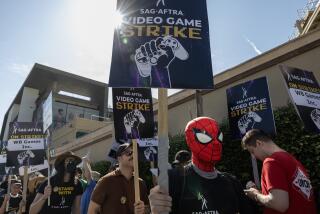Ads Enter the Fantasy World of Video Games
- Share via
Set 30,000 years into the future, the video game Anarchy Online seems an unlikely place to see billboards advertising the newest CD by Motley Crue or the “Family Guy” on DVD.
But such ads are increasingly showing up in the virtual realm of video games as corporations pursue potential customers into their escapist fantasies.
With growing numbers of young men spending their spare time playing video games instead of watching television, some advertising companies have begun specializing in infiltrating digital entertainment. They are pioneering the use of in-game billboards and product placement, which some experts say could increase significantly in coming years.
“TV ratings among males 18 to 34 have declined specifically due to video games,” said Michael Goodman, a senior analyst at research firm Yankee Group in Boston. He estimates the market for in-game advertising will reach $562 million by 2009, up from just $34 million last year.
The importance of the burgeoning market was evident last month in Los Angeles when about half a dozen game publishers including Electronic Arts Inc. and Ubisoft Entertainment outlined their coming titles to an audience of advertisers and entertainment executives at a marketing event known as the L.A. Office RoadShow. The show, traditionally tailored to the television, film and movie industries, hosted its first video game day this year.
“We just got to the point where we had to get involved in gaming,” said Mitch Litvak, the event’s founder. “In the marketing community it’s so important to reach that audience for specific brands that if we didn’t do it, someone else would have.”
Some video game makers are eagerly exploring the financial opportunities created by allowing advertising to appear in their fantasy worlds, noting that the additional revenue can help cover the millions of dollars it costs to develop a cutting-edge title.
The publisher of Anarchy Online, Funcom, has used revenue from billboards in Anarchy Online to subsidize a basic version of the game for free over the Internet, said Terri Perkins, a Funcom product manager. It also has used the money to develop expansions to the Anarchy Online fantasy world that players can pay extra for.
Executives at Ubisoft, publisher of the popular Splinter Cell action games based on the work of writer Tom Clancy, say they have poured ad revenue into developing titles rather than bolstering profit.
“It’s expensive when you try to make the game longer, more exciting and introduce new technologies,” said Jeffrey Dickstein, strategic sales and licensing manager for Ubisoft. “But we need to do it to stay competitive.”
Other video game makers, however, are concerned that adding advertisements to their creations will alienate customers used to escaping into science-fictional and Tolkien-esque digital worlds far from the reach of Madison Avenue.
“We’re not going to paint a Nike swoosh on the side of the castle of Qeynos,” said Chris Kramer, a spokesman for Sony Online Entertainment Inc., the publisher of EverQuest, an Internet-based game set in a swords-and-sorcery fantasy world. “That’s the sort of thing that would really turn off the player.”
Indeed, Funcom’s Perkins recalled a complaint by a player who said he could understand that advertising would exist in the futuristic world of Anarchy Online, but wondered, “How can you say Motley Crue will be around 30,000 years from now?”
Some avid gamers also are growing concerned that arrangements between publishers and advertisers are changing their beloved hobby. They worry that the pursuit of advertising dollars could ultimately influence the decisions on which games are developed, forcing game makers to set more titles in the present instead of the type of surreal worlds for which the industry has become famous.
“I don’t want to imagine the day when prospective future Marios, Zeldas and Grim Fandangos are brushed aside for numerous clones of Splinter Cell, SWAT and NFS Underground, just to squeeze in a little more advertising space,” said Rahul Chacko, a 24-year-old graphic artist from India.
Gamers’ concerns aside, Sony did partner with Pizza Hut on a promotion that allowed EverQuest players to type the command “/pizza” while playing the game to order a pizza over the Internet, Kramer said. The company also felt it was appropriate, he added, to sign up with Massive Inc., a New York-based ad agency, to run ads in its futuristic game PlanetSide.
Massive is establishing a network of video game titles, offering advertisers an aggregate audience across multiple games. Once Massive’s software is integrated in a video game, ads can be switched in and out of a title played on computers and consoles with an Internet connection without having to shut down the game or requiring players to download a patch.
The connection allows a single title to host countless so-called real-time dynamic ads on predefined locations woven throughout the game -- including cans, clothing and buses -- or display 15-second commercials on billboards and televisions. So far, Massive has inked deals with 26 video game publishers, including Funcom, Ubisoft and Take-Two Interactive Software Inc. and more than three dozen advertisers including Best Buy Co., Paramount Pictures and Coca-Cola Co.
The company’s software, according to chief marketing officer Nicholas Longano, is scheduled to be in 43 video game titles by Christmas. He contends that the ads will not only boost each title’s profitability by 20% to 30%, or $1 to $2 per copy of a game, but that they will also make the games look more realistic.
“For the first time you have an advertiser’s message that actually makes game play better,” said Longano, whose firm has opened offices in Santa Monica and San Francisco. “It’s unlike a television environment where advertising is seen as being intrusive.”
A Nielsen Interactive Entertainment study commissioned by Double Fusion, a Massive competitor, found that half of 900 game players surveyed agreed that advertising makes a game more realistic, with 21% disagreeing. Double Fusion co-founder Guy Bendov said his company had struck deals with four European video game publishers and hoped to be working with publishers in this country by the end of the year.
Advertising in video games is a relatively new phenomenon fueled in part by the industry’s growing popularity. U.S. video game software sales totaled $7.3 billion last year, more than doubling since 1996, according to NPD Group.
Industry observers point to the multimillion-dollar deal Electronic Arts inked with Intel Corp. and McDonald’s Corp. in 2002 to incorporate their products into the Sims Online, as a watershed moment for an industry that traditionally paid licensing fees to feature companies’ products in their games.
But Electronic Arts, the world’s largest independent game publisher, has sold ads in only 10 of its 35 titles, and is proceeding into the advertising arena with caution to ensure that both advertisers and players are pleased with the result.
“We do continue to believe conservative projections are the best strategy,” said Julie Shumaker, EA’s national director of sales for video game advertising. “The hype is a bit more than the reality of it.”
A key barrier to expanding the market for advertising in video games is the need for an Internet connection to refresh dynamic ads and monitor their exposure to players. Far more games are sold for consoles than personal computers and only about 6% to 7% of consoles sport Internet connections, said Yankee Group’s Goodman, who added that he didn’t believe video game advertising would ever rival advertising on TV.
Michael Pachter, a Wedbush Morgan Securities analyst, predicted the market would be limited to 10% of its potential until someone figured out a way to deliver ad spots to all gamers, possibly by persuading companies such as Sony Corp. and Microsoft Corp. to make their game machines download information regularly, as TiVo recording devices now do to update television programming schedules.
“There’s plenty of money there,” Pachter said. “The question is: Is it a hundred million bucks or is it 10 billion?”






